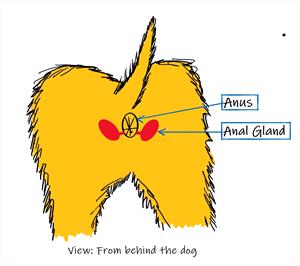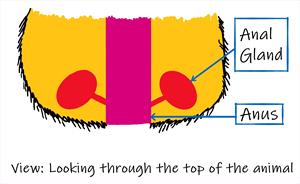anal gland. diagram idea

Illustration by Shalini Radhakrishnan/VIN
What are anal glands?
Anal glands are two sac-like structures that release an unmistakable, foul-smelling fluid. It’s really unfortunate when veterinarians get that fluid on their clothing because then they smell like that all day, as does the exam room. Dogs and cats use this fluid to mark their territory when they poop. Anal glands are not important for your pet’s health and can be removed if medically necessary (i.e, constant infections, recurrent abscess formation), but not without risking incontinence.
What animals have anal glands?
- Female and male cats, dogs, and many other animals
- People do not have them
Anal gland. top view

Illustration by Shalini Radhakrishnan/VIN
What is the anatomy of an anal gland?
Each animal has two glands located on the left and right side of the anus. Each gland connects to the end of the anal canal through a small connecting tube (duct). When your pet is defecating (pooping) the feces (poop) passes through the anal canal and squeezes the sacs, releasing the smelly fluid.
What is an anal gland abscess?
An anal gland abscess is a painful infection of the anal glands. During an infection, pus builds up in the sac. The infection prevents the foul-smelling anal gland fluid from leaving the sac. The anal gland swells with the fluids and may even burst. This abscess is extremely painful and should be treated immediately.
Can my pet get an anal gland abscess?
Animals with anal glands can have an anal gland abscess. There is no breed, gender, or age group that is more likely to have this happen. There are a variety of potential explanations of why the anal gland swells and even ruptures, such as underlying diseases or allergies. By working together, you and your veterinarian will create the best treatment plan to prevent abscesses from forming in the future.
What are the symptoms?
- Scooting across the floor to put pressure on the anal gand and release the fluid
- Trauma and biting of the tail and anal area
- Matting of the hair at the anal area
- Reluctance to sit and to poop
- Constipation and anal discharge
- Crying, whimpering or signs of pain
- Being withdrawn and lethargic, not wanting to eat
- Swelling and redness of anal area
Should I treat the anal gland abscess?
Yes, and treat it immediately. Although this is not a medical emergency, make an appointment with your veterinarian as soon as possible. An abscess is painful for your pet and infection can spread to different parts of the anus. The veterinarian will clean the abscess and treat the infection. In some cases, anesthesia or sedation is needed to clean it. Treatment only stops after your veterinarian has rechecked your pet to determine if the abscess is healing properly. The goal of this treatment is to minimize the swelling and discomfort to your pet. Treatment may include:
- Cleaning and unclogging of the anal duct to prevent fluid buildup
- Anti-inflammatory medications to reduce swelling and pain
- Antibiotics to treat infection
- Recheck by your veterinarian is necessary
Is there any additional testing needed?
There may be additional testing depending on each case. Standard tests that may be needed include complete lab work, especially if anesthesia is needed. In complex or unusual cases, culture or biopsy may be needed.
Does my pet need surgery?
These sacs only produce scent markers and are not necessary for your pet’s health. If your pet continues to have infected and abscessed anal glands, a more permanent treatment may be needed. This involves removing the anal glands entirely. The surgery may affect sphincter strength, causing incontinence. This severe side effect makes surgery a last resort for chronic anal gland abscess offenders.
How can I prevent it?
If your pet continues to have anal gland swelling and infection, your veterinarian may suggest high fiber diets, hypoallergenic diets, or surgical removal of the anal sacs. Knowing the cause of your pet’s continued anal gland abscesses is important for coming up with a prevention method. Your veterinarian will work with you to come up with the best plan to prevent discomfort and pain in your pet.